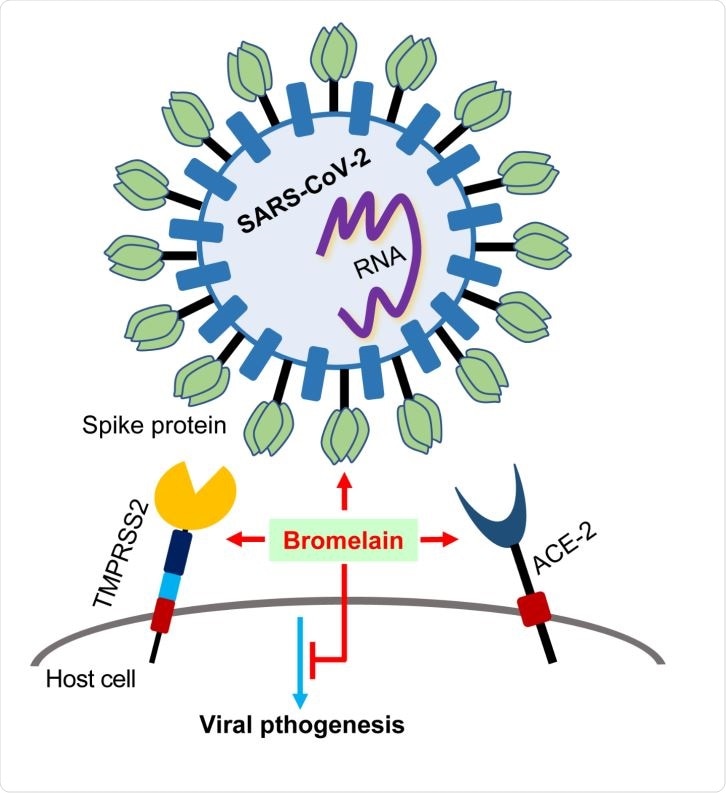Results of a recent research endeavor from the United States indicate that bromelain or bromelain rich pineapple stem may be utilized as an antiviral agent against coronavirus disease (COVID-19), but also for potential future coronavirus outbreaks. This exciting paper is currently available on the bioRxiv* preprint server.
Severe acute respiratory syndrome coronavirus-2 (SARS-CoV-2) is already well-known for its rapid human-to-human transmission, responsible for the relentless pandemic spread of dangerous COVID-19.
But every day, we learn a bit more about SARS-CoV-2 immunology. The initial interaction between Transmembrane Serine Protease 2 (TMPRSS2), primed spike glycoprotein (S-protein), and host cell receptor angiotensin-converting enzyme 2 (ACE-2) is a pre-requisite for cell entry and COVID-19 pathogenesis.
At the moment, infected patients are treated with different antiviral, anti-inflammatory, and antimalarial agents. Nevertheless, the response rate is relatively modest, and there is a need to confirm both the safety and efficacy profile of those drugs against COVID-19.
But repurposing existing drugs or develop new (either virus-based or host-based) antivirals against SARS-CoV-2 is still a way forward. The pertinent question is, could we maybe use bromelain – a dietary supplement isolated from pineapple stem used to treat patients with pain, inflammation, and thrombosis – for COVID-19 patients as well?
This hypothesis was tackled by researchers from the University of Nebraska Medical Center and the FDA's Center for Biologics Evaluation and Research (CBER) in Silver Spring in the United States, with rather exciting findings.

Bromelain inhibits / cleaves the expression of ACE-2 and TMPRSS2, it cleaves / degrades SARS-CoV-2
spike protein and inhibits S-Ectodomain binding and SARS-CoV-2 infection.
Cloning and expressing recombinant proteins
Since ACE-2 and TMPRSS2 are full of cysteine residues that establish disulfide bonds to support the protein structure, this research group primarily appraised the effect of bromelain (which is a cysteine protease) on ACE-2 and TMPRSS2 expression.
The full-length genome sequences of 45 SARS-CoV-2 isolates were analyzed in-depth. At the same time, the African green monkey kidney epithelial cells (Vero E6) was chosen as the primary cell line utilized in this study.
The researchers cloned and subsequently expressed SARS-CoV-2 S-protein ectodomain that contains insect cell secretion signal. Next, they have determined the interaction between the purified S-Ectodomain and human recombinant ACE-2 using surface plasmon resonance technology (i.e., real-time detection of biomolecular interactions).
Finally, they have expressed SARS-CoV-2 S-Ectodomain tagged with a green fluorescent protein in Tni insect cells from Trichoplusia ni (i.e., cabbage looper). Surface resonance plasmon and Luminex assay were used to reveal the purified S-Ectodomain binding to human ACE-2, as well as immunoreactivity with COVID-19 positive samples.
Multiple ways of halting SARS-CoV-2
"We demonstrate that bromelain (isolated from pineapple stem and used as a dietary supplement) treatment diminishes the expression of ACE-2 and TMPRSS2 in VeroE6 cells and dramatically lowers the expression of S-Ectodomain", say study authors.
More specifically, it was shown that bromelain decreases the expression of both ACE-2 and TMPRSS2 in a dose-dependent manner in Vero E6 cells. Moreover, bromelain's cysteine proteolytic activity was notably higher in ACE-2 when compared to TMPRSS2.
Even more important was the finding that the bromelain treatment was able to halt the interaction between S-Ectodomain and Vero E6 cells, significantly diminishing the SARS-CoV-2 infection in this cell line.
Furthermore, this study indicates that the SARS-CoV-2 spike glycoprotein has both highly sialylated N- and O-linked glycans, and bromelain managed to cleave it. Consequently, a loss of negatively charged sialic acid groups in the N- and O-linked glycans may cause a decreased mobility shift of S-Ectodomain.
Bromelain as a broad-spectrum antiviral
"For the first time, our results demonstrate that bromelain can inhibit SARS-CoV-2 infection by targeting all three host ACE-2 and TMPRSS2, and SARS-CoV-2 S-proteins", summarize study authors in this bioRxiv paper.
Previous studies have demonstrated that bromelain can be utilized to treat patients with inflammation and pain and that the compound is well absorbed and with prolonged biological activity. All of these advantages can be exploited when treating patients with COVID-19.
In conclusion, either bromelain or bromelain rich pineapple stem represents a viable option as an antiviral for treating not only COVID-19 but also potential future outbreaks of other coronaviruses.

 This news article was a review of a preliminary scientific report that had not undergone peer-review at the time of publication. Since its initial publication, the scientific report has now been peer reviewed and accepted for publication in a Scientific Journal. Links to the preliminary and peer-reviewed reports are available in the Sources section at the bottom of this article. View Sources
This news article was a review of a preliminary scientific report that had not undergone peer-review at the time of publication. Since its initial publication, the scientific report has now been peer reviewed and accepted for publication in a Scientific Journal. Links to the preliminary and peer-reviewed reports are available in the Sources section at the bottom of this article. View Sources
Journal references:
- Preliminary scientific report.
Sagar, S. et al. (2020). Bromelain Inhibits SARS-CoV-2 Infection in VeroE6 Cells. bioRxiv. https://doi.org/10.1101/2020.09.16.297366.
- Peer reviewed and published scientific report.
Sagar, Satish, Ashok Kumar Rathinavel, William E. Lutz, Lucas R. Struble, Surender Khurana, Andy T. Schnaubelt, Nitish Kumar Mishra, et al. 2021. “Bromelain Inhibits SARS‐CoV‐2 Infection via Targeting ACE‐2, TMPRSS2, and Spike Protein.” Clinical and Translational Medicine 11 (2). https://doi.org/10.1002/ctm2.281, https://onlinelibrary.wiley.com/doi/10.1002/ctm2.281